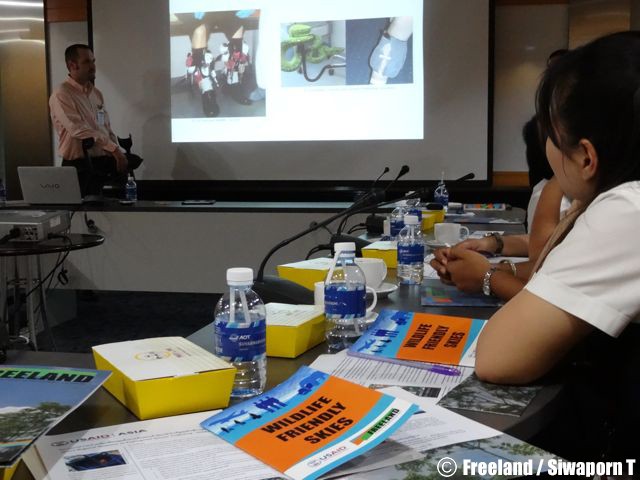
For Immediate Release
BANGKOK, February 24, 2014 – The skies are getting safer for endangered species after one of the world’s busiest airports and two major airlines joined together to launch a new global program to stop wildlife trafficking through airports.
On February 20 and 21, flight attendants and cargo and baggage handlers from Delta Airlines and Kenya Airlines joined airport security and customs officials to learn how today’s traffickers are attempting to circumvent inspectors and laws to smuggle rare and endangered wildlife through airports around the world.
The course took place at Bangkok’s Suvarnabhumi International Airport, a recognized hotspot for wildlife trafficking, and major regional transport hub serving more than 52 million passengers in 2012.
Together with Royal Thai Customs, Airports of Thailand (AOT), and the airlines, Freeland, a Bangkok-based counter-trafficking organization, launched the Wildlife Friendly Skies training as part of the U.S. Agency for International Development (USAID) funded Asia’s Regional Response to Endangered Species Trafficking Program. Now in its third year, the program is the U.S. Government’s largest counter wildlife trafficking initiative and works throughout the Association of Southeast Asian Nations (ASEAN) and China to stop wildlife crime. The new airline partnership was brokered jointly with the U.S. Embassy Bangkok, and highlights the importance of public and private sector collaboration to combat illicit trade.
The course focused on Suvarnabhumi Airport’s links to wildlife source, transit and consumer countries in Africa, Asia, Europe and North America. Law enforcement and wildlife experts from Freeland showcased real incidents to illustrate the scale and seriousness of wildlife smuggling. Trainers also provided tips on how to detect and respond to wildlife trafficking. WildScan, a new smartphone application developed with USAID funding by Freeland for identifying endangered species and wildlife crime was also introduced. Course organizers aired public service announcements featuring local key opinion leaders, as well as the U.S. Ambassador to Thailand that have been developed for television, airports and airlines.
The illicit trade in endangered species is estimated at $19 billion per year. Run by organized criminal syndicates, wildlife trafficking is rapidly depleting the world’s biodiversity and traffickers commonly use airlines to smuggle endangered and threatened species such as birds, primates, and turtles.
Freeland will continue to expand Wildlife Friendly Skies, tailoring the course to specific airports and airlines to ensure relevant staff are equipped to help end wildlife trafficking.







Comment
Make a general inquiry or suggest an improvement.